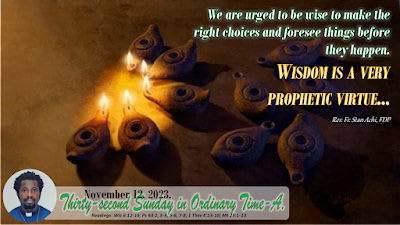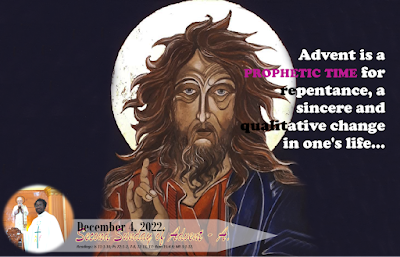LOVE WISDOM, SEEK WISDOM.
November 12, 2023.
Thirty-second Sunday in Ordinary Time – A.
Readings: Wis 6:12-16; Ps 63:2, 3-4, 5-6, 7-8; 1 Thes4:13-18; Mt 25:1-13.
"Five of them were foolish and five were wise."
Matthew 25:2
An Ashanti proverb says: “Wisdom is like a good skin bag. Every
man carries his own.” A Spanish proverb adds: “What the fool does at last the
wise man does at first.”
The liturgical year draws closely to its end. We are today,
the 32nd Sunday, in the Ordinary Time A. And as people walking toward the end
of a time and a season, the attitude that is required from us is not only that
of vigilance but also wisdom. We are urged to be wise to make the right choices
and foresee things before they happen. Wisdom is a very prophetic virtue. And
as such, wisdom is called to be the most Christian attitude. For, by Baptism,
we are made prophets, people capable of predicting events and getting ready for
them.
We are talking of the end of the liturgical year, which we
are used to, for it is a repetitive cycle. We go from the Year A to the Year B
and C, and we start again. But beyond this cycle, there is another end that,
even though we do not know when it will happen, is more than obvious to come,
that is, death, our own death, the end of our earthly pilgrimage. It will be
the time for us to encounter our heavenly spouse, Christ our Lord. For this
final end, wisdom should be our companion and our light.
About the end that is death, the Catechism says: "The
Church encourages us to prepare ourselves for the hour of our death. In the
ancient litany of the saints, for instance, she has us pray: "From a
sudden and unforeseen death, deliver us, O Lord"; to ask the Mother of God
to intercede for us "at the hour of our death" in the Hail Mary; and
to entrust ourselves to St. Joseph, the patron of a happy death. Every action
of yours, every thought, should be those of one who expects to die before the
day is out. Death would have no great terrors for you if you had a quiet
conscience... Then why not keep clear of sin instead of running away from
death? If you aren't fit to face death today, it's very unlikely you will be
tomorrow... Praised are you, my Lord, for our sister bodily Death, from whom no
living man can escape. Woe on those who will die in mortal sin! Blessed are
they who will be found in your most holy will, for the second death will not
harm them." CCC 1014
The time will come for us to die. But the main question is,
are we ever ready to face it? The attitude and virtue in front of death, we said,
is wisdom. Thus, the readings invite us today to love, seek, and espouse
wisdom.
There is a beautiful ancient invocation that could open us
to the readings and the search and thirst for wisdom: "Maranatha"
from the Aramaic מרנא תא (“Lord, come"”) or מרן אתא (“our lord has
come”). It is a call and an expectation. We all await the coming of the Lord.
Moreover, we Christians await not only the end of a liturgical year but the
coming of the Lord in glory. Jehovah's Witnesses, Mormons, and Born-again base
all their preaching on it: “The Lord is coming soon…” This coming will be the
time of the great and definitive encounter with the spouse. For the cry of
‘Maranatha’ to get its perfect meaning, we ought to be always ready to receive
him. Thus, the calling for vigilance which links our three readings.
While Paul, in the second reading, describes the expectation
of the faithful of Thessalonica and their vigilance, the first reading and the
Gospel exhorts us to embrace wisdom. In the first reading, we have the great
personification of wisdom. It is portrayed as a resplendent and seductive young
woman. We read that her beauty is "radiant and unfading." That she
makes herself found by those who love and seek her. To find her, however, one
needs vigilance.
So, the Gospel will emphasize that aspect of vigilance. The
Lord, through the parable of the Ten Virgins awaiting the coming of the spouse,
teaches us the attitude of the genuine Christian. We are urged to be wise, that
is, to be always prepared. Among the Virgins, he says, five were wise, while
five were foolish.
The purpose of this parable is clear. It is to explain the
Kingdom of Heaven. In our waiting for God's kingdom, we are like these
bridesmaids who go out to meet the bridegroom. Where then do we stand? Are we
among the foolish who did not fill their lamps with sufficient oil or among the
wise, who have extra oil? The answer is up to each one of us. Our actions, our
words, and our lives will prove where we stand.
The oil here can mean love and good actions. As we see, the
ten Virgins went all out to meet the groom. It is just like each one of us
comes to church and prays. But it is not enough to pray or be a good
churchgoer. Our actions and love speak louder. Farther than being a good
Christian or churchgoer, we should not lack in good actions toward the needy
and in love toward our neighbor. At the end of our lives, the Lord will not ask
us how many masses we have attended, nor how many sacraments we have received.
He will question us about love and good actions. Faith in se is not enough if
it is not nourished by love. Faith was the lamp the ten Virgins had in hand.
And as we can notice, they all have it. What made the five others wise was
their love and good actions, while the foolish contented themselves only on
faith without action. May we not forget this strong admonition of the Apostle
James: "Faith of itself, if it does not have works, is dead..." Ja
2:17 The Apostle insists that we should not be foolish men, and he gave the
example of Abraham and Rahab who were counted wise because of their living and
active faith.
To finish, this beautiful insight I read somewhere: "One important aspect of the parable that does not usually receive a lot of attention is that all the virgins became drowsy and sleepy. In many ways, this shows that even believers will get caught up in the day-to-day trials and tribulations that can distract them from keeping their eyes on the Lord. People will be born and die, waiting. Believers and unbelievers alike are subject to the passage of time and the effects of the world. The difference between the two is that when the herald announces the bridegroom’s arrival, which in the parable represents the signs of the End of Days, the believers will be ready. When Jesus returns, they will be admitted into the Kingdom of Heaven, and attend the Marriage Supper of the Lamb, as shown in John’s Revelation. For those who are unprepared, they will be rejected, because they did not know Jesus in their life…z All people who have lived, are living, or will live in time are one of these two groups: wise or foolish, prepared or unprepared, believers or unbelievers." So, comes again our question: where do you stand? Are we wise or are we foolish?





Comments
Post a Comment